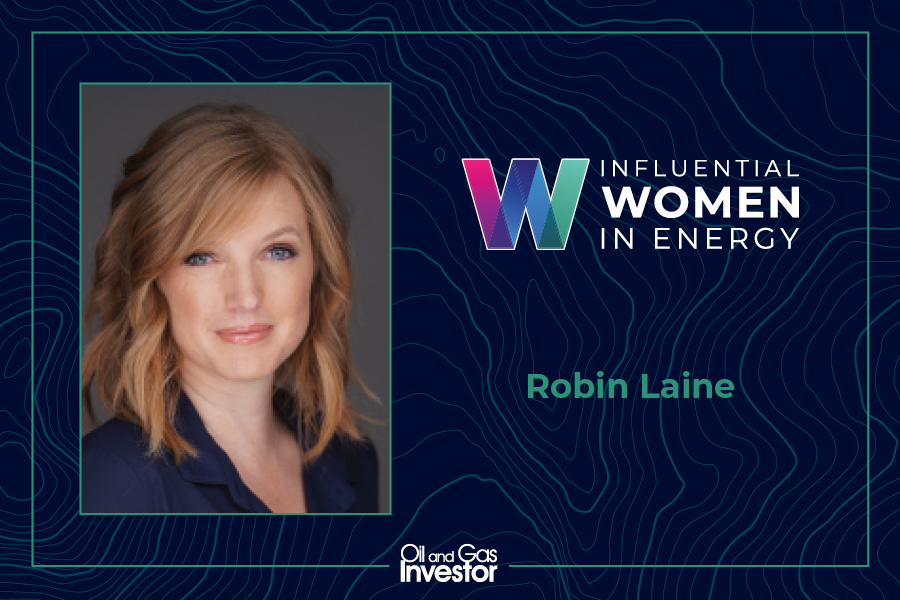Robin Laine


For Robin Laine, it’s all about the “why.”
“Knowing my ‘why’ as a woman in this industry has allowed me to remain steadfast in the challenges I have faced,” she said. “When I was confronted by pushback as a young woman in oil and gas, and even now as a female CEO, I choose to focus my efforts and mentality on my ‘why’ of helping developers make environmentally informed decisions.”
In her first oil and gas job as an environmental consultant, she quickly understood that pipeline projects traversing vast amounts of land almost always have the potential to impact sensitive environmental resources.
“While the oil and gas professionals working on these projects want to do the right thing in regards to the environment, they may not always have all of the resources on hand to make the best decisions about pipeline routing in respect to the environmental conditions of the land,” Laine said. “I have spent my career working to protect our natural resources and landscape here in the U.S. while also enabling the development of projects that support our energy needs.”
Accomplishing those goals requires capital. Laine is particularly proud of raising Series A funding for Transect.
“Less than 3% of all [venture capital] funding is directed to female entrepreneurs, so receiving the interest of high-value investors was empowering and reiterated the importance of Transect’s mission to solve the environmental compliance problem,” she said. “Building a tech company can feel lengthy and lonely, but the arduous journey is worth it for the growth it has provided for me, my employees and my company.”
A career move to a larger consulting firm in 2012 was key to developing her leadership skills. At her new company, she was responsible for building the natural resources program from scratch. Her first project was a 500-mile pipeline from Weld County, Colo., to Cushing, Okla.
“Needless to say, it was a daunting task,” Laine said. “Being in my late 20s during this role, I held tremendous responsibility for everything from hiring to budgeting to field work coordination to final deliverable.”
However, she also had a boss who trusted her leadership abilities and provided the space for her to learn and grow. The project was a success.
“Not only was this an incredible opportunity to develop my technical skills, but it also shaped much of my character as a leader,” Laine said.
Not that leadership is easy. Her skills at environmental consulting were so formidable that managers assumed she would be adept at managing others to do that same thing.
“I’m still trying to figure out how to be a good leader; it’s quite hard,” she said. “I’ve had to learn to adapt, research, actively seek out the expertise of those around me and, most importantly, learn to trust myself and show up authentically.”
Laine’s advice to young professionals is to first master their craft. The first decade out of college is about establishing a career and starting at the bottom, but that’s what lays the foundation for future opportunities.
“Also, be careful how much you job hop,” she said. “Any resume that shows a lack of commitment goes to the bottom of my pile.”
Laine adds, with some frustration, that women have to work harder, especially in any field that is traditionally dominated by men.
“But the secret weapon will always be building professional and friendly relationships with other women,” she said. “It feels like an unspoken code that we will help each other open doors however we can, from whatever position we’re in, because it’s a small cohort and we want to see each other succeed.”
That goes back to her “why.”
“Finding your why and searching out other women to support your mission are critical to success in this industry,” Laine said. “The midstream sector contains very few women, which, in my experience, means we are that much more willing to lift each other up in this small community. I would go to significant lengths for a woman who wants to grow and thrive in this industry, and the lengths other female leaders have gone to for me are truly incredible.”
Check out the rest of Hart Energy's 2024 Women in Energy here.
1. I used to be a zookeeper.
2. Outside of professional work, I am passionate about non-profit causes that serve my local community in San Antonio and our neighbors on the border. I am on the board of For Her, an organization that provides resources and support for marginalized women to take autonomy of their lives, and Isaiah 55 Ministries, an organization committed to serving the deaf community in Mexico.
3. I am permitted by the U.S. Fish and Wildlife Services to survey for golden-cheeked warblers, the endangered songbird that also serves as Transect’s mascot.
